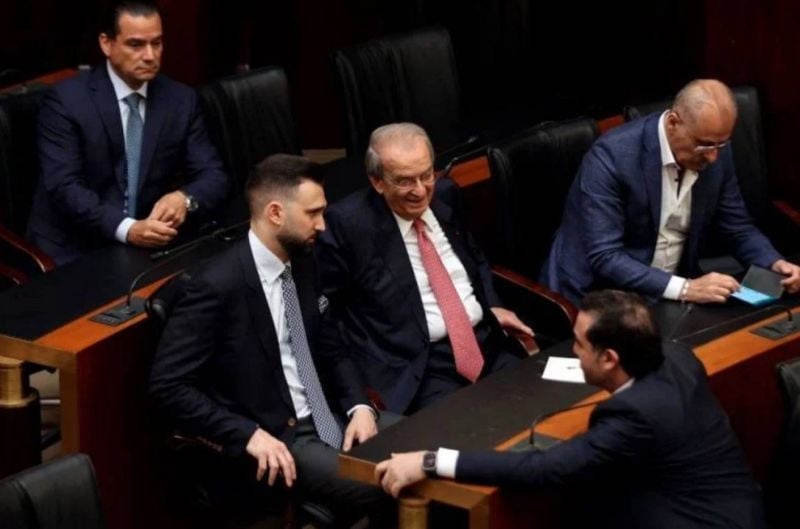
Deputies belonging to the Democratic Rally (Joumblattist bloc) during the electoral session of June 14 in the Chamber. (Credit: Anwar Amro/ AFP)
After MP Michel Moawad and Jihad Azour, what is next for the opposition parties? This question is particularly directed towards the Lebanese Forces (LF), Kataeb, and the Progressive Socialist Party (PSP), who rallied behind Azour in a bid to block Hezbollah’s candidate, Sleiman Frangieh.
It also applies to the Free Patriotic Movement (FPM), which seems to be willing to go to great lengths — even at the risk of severing ties with Hezbollah — to prevent the election of the Marada leader.
Azour secured 59 votes, which he owes much to the support of FPM leader Gebran Bassil. In contrast, Moawad’s vote count peaked at around 45.
The question of what comes after Azour is already on the tip of everyone’s tongue, as Wednesday’s parliamentary voting session demonstrated that no candidate can be imposed on the other players.
Azour’s backers however, show no intention of making concessions, at least not at this stage.
In a press statement released on Thursday, nearly 30 MPs supporting Azour emphasized the significance of the presidential election, stating, “This is not child’s play. This is a presidential election. We’re not going to change candidates at every voting session.”
To Azour’s key supporters, Wednesday’s electoral showdown was not simply about filling the presidential vacancy; it was a strategic fight for votes to send a resolute message to the March 8 camp. The message was a clear rejection of a candidate who is widely opposed by various political factions, and especially the Christian community.
“We had 77 MPs who stood against Hezbollah,” stated an opposition MP.
The anti-Hezbollah coalition aims to leverage this position of strength to enhance its negotiating power in determining the next head of state.
‘It is about what happens after Frangieh’
“We were only five votes short of reaching the absolute majority of 65 required to elect a president in the second round,” Moawad told L’Orient-Le Jour. “So, it would be premature to abandon Jihad Azour at this stage. On the contrary, we should focus on increasing his support.”
“The upcoming phase is not about what happens after Jihad, but rather what happens after Sleiman Frangieh,” stressed Moawad, who added that while Azour secured 59 votes, “his opponent garnered the support of MPs with the help of Hezbollah.”
Moawad added that his camp will have to continue to work on winning over a few undecided MPs.
Similarly, the LF has no intention of backing down.
“The significance of Wednesday’s session lies in the fact that the opposition was able to impose on the moumanaa [resistant, i.e., the Hezbollah-led camp] a serious battle in which Jihad Azour achieved a remarkable vote count,” LF spokesperson Charle Jabbour told L’Orient-Le Jour. “We are therefore not going to abandon Azour until the opposing camp gives up the Frangieh option.”
The same sentiment is echoed among the PSP. “It is still too early to discuss an alternative,” said Faycal Sayegh, a PSP-aligned MP.
Sayegh’s statements can be interpreted as an effort to alleviate concerns among opponents who are worried about a potential reversal by the PSP parliamentary bloc, the Democratic Gathering, which cast eight ballots in Azour’s favor in the last voting session.
The PSP decision to vote for Azour is said to be influenced by Taymour Joumblatt, the son and political heir of outgoing PSP leader Walid Joumblatt.
Walid Joumblatt had initially aligned with the opposition in supporting Moawad, but later advocated for a consensus candidate acceptable to Hezbollah.
“It is natural to support Azour’s candidacy, especially since the majority of Christian parties have endorsed him, and we want to respect their preferences in this election,” Sayegh said.
However, in light of the current situation where Azour is now viewed as a defiant figure by the Hezbollah camp and Parliament Speaker Nabih Berri is advocating for broader dialogue, the PSP bloc seems to be open to dialogue but stresses the need of tangible outcomes.
“We are in favor of dialogue, even if we disagree with Nabih Berri about the presidential election. But as long as the dialogue has not yet started and led to concrete results, our position remains unchanged,” Sayegh said.
The FPM ‘will not turn its back’
The FPM does not appear to have a change of heart. Bassil has in fact thrown all his weight behind Azour’s candidacy, ensuring that his bloc was committed to vote for him.
Bassil wanted also to send a clear message to Hezbollah that “no one can override the will of Christians,” as he mentioned in a tweet on Wednesday after Parliament’s voting session.
However, it's worth noting that Bassil, despite his current confrontation with Hezbollah, remains mindful of the 2006 agreement that binds the two parties and the implications it holds for future developments. He previously expressed his willingness to engage in dialogue “without preconditions,” keeping the door open for potential discussions.
This is yet another criticism directed at Hezbollah, which claims to be open to discussions but remains adamant about supporting Frangidh. “As long as that's the case, we won’t abandon Jihad Azour,” said a former FPM MP.
So how should Bassil’s call for dialogue be interpreted?
“It’s not just any dialogue. With Hezbollah, we want to pave the way for a candidate who can secure the presidency,” a close associate of Bassil told L’Orient-Le Jour.
“And with the opposition, we want to address unresolved political issues and pending matters,” he added, stressing that the next phase will focus on strengthening Jihad Azour's position as the preferred candidate.
This article was originally published in French in L'Orient-Le Jour. Translation by Sahar Ghoussoub.